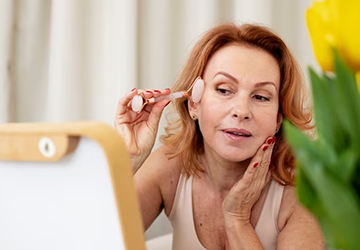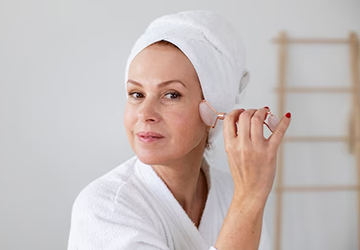fashion
When pondering when to start anti-ageing treatments, it's crucial to consider various factors influencing skin ageing. The late 20s to early 30s is a pivotal period for introducing anti-ageing creams into skincare routines. This timeframe is significant because it's typically when the skin slowly begins to exhibit signs of ageing, such as fine lines, decreased skin resilience, and subtle changes in texture and pigmentation. However, this is a broad guideline and should be adapted to each individual's unique skin type, genetic background, and environmental exposures. For instance, individuals who have experienced significant sun exposure or have a family history of early skin ageing might benefit from starting anti-ageing treatments sooner. Conversely, those with fewer environmental stresses or genetic predispositions to later skin ageing might choose to begin such treatments at a later age.

Personalising Your Approach: Identifying the Best Age for Anti-Aging Creams
In discussing the best age for anti-ageing creams, it is essential to highlight the importance of a tailored approach. Skin type, lifestyle choices, and environmental factors determine the right time to use these products. For example, someone with dry skin might need to start using hydrating and rejuvenating creams earlier than someone with an oilier skin type. This difference is because dry skin can show signs of ageing more quickly due to its tendency to develop fine lines and wrinkles. Additionally, lifestyle choices such as diet, smoking, and sun exposure can accelerate the ageing process, thus necessitating an earlier start to anti-ageing treatments.
Developing a Comprehensive Anti-Aging Treatment Guide
A practical anti-ageing treatment guide should encompass more than just the application of creams and serums. It involves a holistic approach to skincare and general health. The guide should advocate for a skincare routine that includes products with active ingredients proven effective against ageing signs. Hyaluronic acid is vital for maintaining skin hydration and plumpness. Alongside topical treatments, the guide should emphasise the importance of a healthy lifestyle, including a nutrient-rich diet, adequate water intake, regular exercise, and sufficient sleep, all of which contribute significantly to skin health. Additionally, protecting the skin from sun damage with broad-spectrum sunscreens and avoiding excessive sun exposure is crucial in preventing premature ageing.
Tailoring Anti-Aging Treatments to Individual Needs
Understanding your skin type and specific needs is critical in determining when to start anti-ageing treatments. Personalised skincare is not just about addressing current skin concerns but also about anticipating and preventing potential issues. For example, someone with a family history of skin conditions like hyperpigmentation or rosacea may need to incorporate specific ingredients into their routine earlier to mitigate these issues. In contrast, individuals with fewer genetic predispositions might focus more on general preventative care. The best age for anti-ageing creams for each person will depend on these factors and their skin’s response to different ingredients and treatments.
Advancements in Anti-Aging Skincare Technologies
In the realm of anti-ageing treatment guides, it's essential to recognise the impact of recent advancements in skincare technology. Innovations in bioactive ingredients and delivery systems have revolutionised how effectively products can combat signs of ageing. For instance, developments in encapsulation technology ensure that active ingredients like retinol and vitamin C are delivered to the skin cells more efficiently, maximising their anti-ageing benefits. In addition, the emergence of personalised skincare, powered by AI and genetic analysis, offers bespoke solutions that cater to individual skin needs, considering factors like genetic predispositions, lifestyle habits, and environmental exposures. This personalised approach underscores the evolving nature of determining when to start anti-ageing regimens, as products can be tailored specifically to one's unique skin profile and ageing concerns.

The Role of Nutrition and Holistic Health in Anti-Aging
Another critical aspect that complements anti-ageing creams and treatments is the role of nutrition and overall health. A diet rich in antioxidants, omega-3 fatty acids, and vitamins can dramatically impact skin health and ageing. Foods high in antioxidants, such as berries, nuts, and green leafy vegetables, help combat oxidative stress, one of the key contributors to skin ageing. Omega-3 fatty acids in fish and flax seeds contribute to skin hydration and may help reduce inflammation, leading to a healthier, younger-looking complexion. Additionally, staying hydrated and minimising alcohol and sugar intake can profoundly affect the skin's appearance. Combining these dietary practices with regular exercise and stress management techniques forms a holistic approach to slowing ageing, complementing anti-ageing creams.
Emerging Trends in Non-Invasive Anti-Aging Treatments
Beyond traditional anti-ageing creams and serums, there is a growing trend in non-invasive treatments that offer anti-ageing benefits without the need for surgery. Techniques such as LED light therapy, microcurrent treatments, and ultrasound skin tightening have gained popularity. These treatments stimulate collagen production, improve blood circulation, and promote cell regeneration, making firmer, smoother, and more youthful skin. As these technologies become more accessible, they offer promising additions to anti-ageing treatment guides, giving individuals more options to combat ageing signs effectively.
Cultural Shifts in Perceptions of Aging and Skincare
Finally, it's essential to acknowledge the cultural shifts in perceiving ageing and skincare. The narrative around anti-ageing treatments is evolving from focusing on reversing the signs of ageing to embracing ageing gracefully while maintaining skin health. This shift promotes a more holistic and positive approach to ageing, emphasising skin health and well-being rather than just aesthetic appearance. This change in perspective influences when to start anti-ageing treatments and the best age for anti-ageing creams, as it encourages an approach centred on long-term skin health and vitality.
Conclusion: Embracing a Comprehensive Approach to Anti-Aging
In conclusion, navigating the journey of anti-ageing treatments involves a multifaceted approach. From understanding when to start anti-ageing regimens to identifying the best age for anti-ageing creams, the key lies in personalisation and adaptation to individual needs and advancements in skincare. The integration of cutting-edge technologies, a focus on holistic health, and embracing emerging non-invasive treatments enhance the effectiveness of traditional anti-ageing creams and practices. Moreover, the evolving cultural narrative around ageing encourages a shift towards celebrating skin health at every stage of life.

